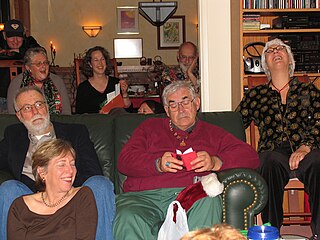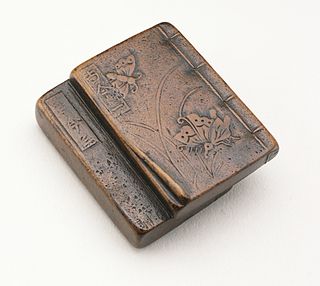Related Research Articles
Senryū (川柳) is a Japanese form of short poetry similar to haiku in construction: three lines with 17 morae. Senryū tend to be about human foibles while haiku tend to be about nature, and senryū are often cynical or darkly humorous while haiku are more serious.
George Swede, is a Latvian Canadian psychologist, poet and children's writer who lives in Toronto, Ontario. He is a major figure in English-language haiku, known for his wry, poignant observations

Paul O. Williams was an American science fiction writer and haiku poet. Williams won multiple awards including the John W. Campbell Award and the Museum of Haiku Literature Award; and was professor emeritus of English at Principia College in Elsah, Illinois and president of the Haiku Society of America.

Japanese poetry is poetry typical of Japan, or written, spoken, or chanted in the Japanese language, which includes Old Japanese, Early Middle Japanese, Late Middle Japanese, and Modern Japanese, as well as poetry in Japan which was written in the Chinese language or ryūka from the Okinawa Islands: it is possible to make a more accurate distinction between Japanese poetry written in Japan or by Japanese people in other languages versus that written in the Japanese language by speaking of Japanese-language poetry. Much of the literary record of Japanese poetry begins when Japanese poets encountered Chinese poetry during the Tang dynasty. Under the influence of the Chinese poets of this era Japanese began to compose poetry in Chinese kanshi); and, as part of this tradition, poetry in Japan tended to be intimately associated with pictorial painting, partly because of the influence of Chinese arts, and the tradition of the use of ink and brush for both writing and drawing. It took several hundred years to digest the foreign impact and make it an integral part of Japanese culture and to merge this kanshi poetry into a Japanese language literary tradition, and then later to develop the diversity of unique poetic forms of native poetry, such as waka, haikai, and other more Japanese poetic specialties. For example, in the Tale of Genji both kanshi and waka are frequently mentioned. The history of Japanese poetry goes from an early semi-historical/mythological phase, through the early Old Japanese literature inclusions, just before the Nara period, the Nara period itself, the Heian period, the Kamakura period, and so on, up through the poetically important Edo period and modern times; however, the history of poetry often is different from socio-political history.
SciFaiku is a form of science fiction poetry first announced by Tom Brinck with his treatise on the subject, The SciFaiku Manifesto. Brinck has been referred to as the "Father of SciFaiku." SciFaiku is inspired by Japanese haiku, but explores science, science fiction (SF), and other speculative fiction themes, such as fantasy and horror. They are based on the principles and form of haiku but can deviate from its structure.
Speculative poetry is a genre of poetry that focusses on fantastic, science fictional and mythological themes. It is also known as science fiction poetry or fantastic poetry. It is distinguished from other poetic genres by being categorized by its subject matter, rather than by the poetry's form. Suzette Haden Elgin defined the genre as "about a reality that is in some way different from the existing reality."
The Science Fiction & Fantasy Poetry Association (SFPA) is a society based in the United States with the aim of fostering an international community of writers and readers interested in poetry pertaining to the genres of science fiction, fantasy, and/or horror. The SFPA oversees the quarterly production of literary journals dedicated to speculative poetry and the annual publication of anthologies associated with awards administered by the organization, i.e. the Rhysling Awards for year's best speculative poems in two length categories and the Dwarf Stars Award for year's best very short speculative poem. Every year since 2013, the SFPA has additionally administered the Elgin Awards for best full-length speculative poetry collection and best speculative chapbook.

Marge Baliff Simon is an American artist and a writer of speculative poetry and fiction.

Gabriel Rosenstock is an Irish writer who works chiefly in the Irish language. A member of Aosdána, he is poet, playwright, haikuist, tankaist, essayist, and author/translator of over 180 books, mostly in Irish. Born in Kilfinane, County Limerick, he currently resides in Dublin.

Anatoly Kudryavitsky is a Russian-Irish novelist, poet, editor and literary translator.
The Dwarf Stars Award is an annual award presented by the Science Fiction Poetry Association to the author of the best horror, fantasy, or science fiction poem of ten lines or fewer published in the previous year. The award was established in 2006 as a counterpoint to the Rhysling Award, which is given by the same organization to horror, fantasy, or science fiction poems of any length. Poems are submitted to the association by the poets, from which approximately 30 are chosen by an editor to be published in an anthology each fall. Members of the association then vote on the published poems, and first through third-place winners are announced. The 2006 anthology was edited by Deborah P. Kolodji, and subsequent anthologies have been edited by an array of editors, including Kolodji, Stephen M. Wilson, Joshua Gage, Geoffrey A. Landis, Linda D. Addison, Sandra J. Lindow, John Amen, Jeannine Hall Gailey, and Lesley Wheeler.
A haiku in English is an English-language poem written in a form or style inspired by Japanese haiku. Like their Japanese counterpart, haiku in English are typically short poems and often reference the seasons, but the degree to which haiku in English implement specific elements of Japanese haiku, such as the arranging of 17 phonetic units in a 5–7–5 pattern, varies greatly.

James Michael Kacian is an American haiku poet, editor, translator, publisher, organizer, filmmaker, public speaker, and theorist. He has authored more than 20 volumes of English-language haiku, and edited scores more, including serving as editor in chief for Haiku in English: The First Hundred Years. In addition, he is founder and owner of Red Moon Press (1993), a co-founder of the World Haiku Association (2000), and founder and president of The Haiku Foundation (2009).
Leza Lowitz is an American expatriate writer residing in Tokyo, Japan and in the American Southwest. She has written, edited and co-translated over twenty books, many about Japan, its relationship with the US, on the changing role of Japanese women in literature, art and society, and about the lasting effect of the Second World War and the desire for reconciliation in contemporary Japanese society. She is also an internationally renown yoga and mindfulness teacher recognized for her work bridging poetry and the spiritual path through disciplines like yoga and mindfulness.
The composition and translation of tanka in English begins at the end of the nineteenth century in England and the United States. Translations into English of classic Japanese tanka date back at least to the 1865 translation of the classic Ogura Hyakunin Isshu ; an early publication of originally English tanka dates to 1899. In the United States, the publication of tanka in Japanese and in English translation acquired extra impetus after World War II and was followed by a rise of the genre's popularity among native speakers of English.
Eye to the Telescope is a quarterly online journal of the Science Fiction & Fantasy Poetry Association, which publishes speculative poetry, including science-fiction, fantasy, horror, and poetry. It was established in 2011.

Lucille Lang Day is an American poet, writer, and science and health educator. Day has authored or edited 20 books and is a contributor to over 50 anthologies. She is best known as a poet and writer for her award-winning memoir, Married at Fourteen: A True Story, for her integration of science imagery and concepts into poetry and for advocating use of poetry as a tool in environmental activism. As a science and health educator, her many achievements have included promoting science education for girls and serving as codirector of Health and Biomedical Science for a Diverse Community, a project that was funded by the National Institutes of Health and aimed to make biomedical science more accessible to underrepresented minorities.
Alexis K. Rotella is an American poet and artist. She has written poems in several of the traditional styles of Japanese poetry, including haiku, senryū, renga, and haibun.
Ann K. Schwader is an American poet and writer of short fiction based in Westminster, Colorado. Schwader is a grand master of the Science Fiction & Fantasy Poetry Association, a multiple winner of the Rhysling Awards, and has been called one of the "top poets" in the speculative poetry genre.
References
- 1 2 3 "Deborah P Kolodji". Haikupedia: The Haiku Foundation Encyclopedia of Haiku. 1 Sep 2021.
- 1 2 3 4 Wilson, Kathabela (July 22, 2017). "Mapping the Artist: Deborah P Kolodji". Colorado Boulevard.
- 1 2 3 Wilson, Stephen M. (May 2007). "Interview with Deborah P Kolodji". Doorways: A Journal of Horror and the Paranormal. Union City, Ohio: Doorways Publications. 2.
- ↑ Kolodji, Deborah P (2004). Seaside Moon. Saki Press. pp. Introduction.
- 1 2 Boston, Michelle (26 June 2014). "The Art of Haiku". USC Dornsife.
- ↑ Kolodji, Deborah P (2004). Seaside Moon. Saki Press. pp. About the author.
- 1 2 Mannone, John C. (Feb 24, 2015). "Interview with Deborah P Kolodji". Silver Blade.
- ↑ McClintock, Michael, ed. (2003). The Tanka Anthology: Tanka in English from Around the World. Red Moon Press. pp. xvi.
- 1 2 "The Dwarf Stars Award". Science Fiction & Fantasy Poetry Association.
- ↑ "Our Staff". Eye to the Telescope.
- ↑ "SFPA Officers and Staff". Science Fiction & Fantasy Poetry Association.
- ↑ "Touchstone Awards for 2016". The Haiku Foundation.
- ↑ "Complete Archive of Merit Book Awards". Haiku Society of America.
- ↑ "Haiku Poets of Northern California Contest 2020". Haiku Poets of Northern California.
- ↑ "Haiku Society of America Rengay Award in Honor of Garry Gay". Haiku Society of America.